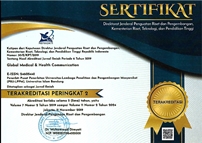Efek Jus Buah Naga Super Merah (Hylocereus costaricensis) dan Simvastatin terhadap Kadar Kolesterol Total Darah dan Bobot Badan Tikus Jantan Galur Wistar Hiperkolesterolemia
Abstract
Penyakit kardiovaskular terjadi akibat beberapa faktor risiko dan di antaranya kadar kolesterol yang tinggi. Menurut survei WHO pada tahun 2008 sekitar 17,3 juta orang meninggal dunia karena penyakit kardiovaskular. Tujuan penelitian ini untuk mengetahui perbedaan efek pemberian jus buah naga super merah (Hylocereus costaricensis) sebagai terapi herbal dengan simvastatin sebagai obat standar yang telah digunakan dalam dunia medis terhadap kadar kolesterol total darah dan bobot badan tikus jantan galur Wistar hiperkolesterolemia. Penelitian dilakukan di Laboratorium Biomedik Universitas Islam Bandung pada bulan April–Mei 2014 dengan menggunakan metode eksperimental laboratorik pada 20 ekor tikus hiperkolesterolemia dengan memberi diet tinggi lipid dan propil tiourasil (PTU) selama 14 hari. Jus buah naga super merah (Hylocereus costaricensis) diberikan secara oral dengan dosis 3,6 g; 7,2 g; dan 10,8 g. Simvastatin sebagai kontrol positif diberikan dengan dosis 0,18 mg. Kontrol negatif dan kontrol normal tanpa pemberian intervensi. Data penelitian dianalisis dengan uji analysis of variance (ANOVA) dan dilanjutkan uji posthoc. Hasil penelitian dengan uji beda terhadap kelompok jus buah naga super merah dosis 3,6 g dan 7,2 g berturut-turut menurunkan kadar kolesterol total sebesar 42,45 mg/dL dan 41,96 mg/dL (p=0,001), sementara dosis 10,8 g cenderung tidak berubah walaupun terjadi kenaikan hanya 1,22 mg/dL (p=0,535). Kelompok kontrol positif menunjukkan penurunan kadar kolesterol total sebesar 21,32 mg/dL (p=0,001). Perubahan bobot badan tikus pada pemberian jus buah naga super merah dosis 3,6 g; 7,2 g; dan 10,8 g dan simvastatin berturut-turut 1,75 g; 22,16 g; 19,5 g; dan 34,75 g yang tidak berbeda secara bermakna (p=0,823). Simpulan, jus buah naga super merah menurunkan kadar kolesterol total lebih tinggi daripada simvastatin, sedangkan bobot badan tikus jantan tidak berbeda.
THE EFFECT OF SUPER RED DRAGON FRUIT JUICE (HYLOCEREUS COSTARICENSIS) AND SIMVASTATIN TO TOTAL BLOOD CHOLESTEROL AND BODY WEIGHT OF MALE WISTAR RATS INDUCED HYPERCHOLESTEROLEMIA
Cardiovascular disease occurs due to several factors including high cholesterol level. According to a survey conducted by WHO in 2008 around 17.3 million people died because of cardiovascular disease. The purpose of this research is to compare the effect of super red dragon fruit juice as herbal therapy and simvastatin as standard drug that have been used in the medical therapy to decrease total blood cholesterol and body weight of male Wistar rats induced hypercholesterolemia. This research was conducted at the Biomedical Laboratory Bandung Islamic University in 2014 Apri–Mei used laboratoric experiment methods using 20 rats that was induced hypercholesterolemia with high-fat feeding and propil tiourasil (PTU) for 14 days. Super red dragon fruit (Hylocereus costaricensis) juice given orally at doses 3.6 g; 7.2 g; and 10.8 g. Simvastatin as a positive control was given at a dose of 0.18 mg. Negative control and normal control without intervention. Research data were analyzed by analysis of variance (ANOVA) test and post hoc test. The results of this research with the different test groups of super red dragon fruit juice dose of 3.6 g and 7.2 g respectively lower total cholesterol by 42.45 mg/dL and 41.96 mg/dL (p=0.001), while 10.8 g doses are unlikely to change despite an increase of only 1.22 mg/dL (p=0.535). Positive control group showed a decrease in total cholesterol levels by 21.32 mg/dL (p=0.001). Changes in body weight of rats in the provision of super red dragon fruit juice dose of 3.6 g; 7.2 g; 10.8 g; and simvastatin were 1.75 g; 22.16 g; 19.5 g; and 34.75 g respectively and were not significantly different (p=0.823). Conclusion, super red dragon fruit juice lowers total cholesterol levels higher than simvastatin, while the body weight of male rats did not differ.
Keywords
Full Text:
PDF (Bahasa Indonesia)DOI: https://doi.org/10.29313/gmhc.v2i2.1535
pISSN 2301-9123 | eISSN 2460-5441
Visitor since 19 October 2016:
Global Medical and Health Communication is licensed under a Creative Commons Attribution-NonCommercial-ShareAlike 4.0 International License.






























.png)
_(1).png)
_(1).jpg)
